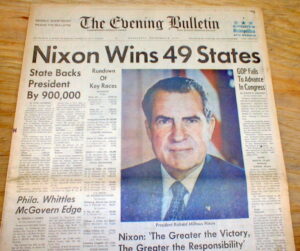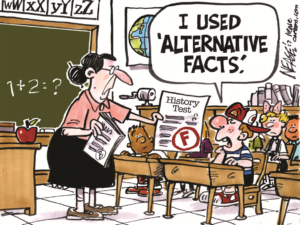The first year I got to vote in a presidential election was 1972 when I proudly cast my ballot for the Republican candidate, Richard Nixon. As far as I could tell, voting for Republicans was what my family had been doing for generations. As far as I was concerned, this was what White Southern Christians were supposed to do.

Needless to say, I was disillusioned by the corruption of that president and the cover-up efforts of those Republicans. I was embarrassed to admit I had wasted my first chance to vote by voting for a crook.
However, this experience became a life changing learning opportunity. I learned that appearances can be deceiving. I learned that people in positions of trust will sometimes look us square in the face and lie to us. I learned that my parents, my grandparents and my White Southern Christian community weren’t always right. I learned to do my own research, challenge my assumptions and trust my own judgment.
I learned that disillusion—letting go of illusions—is a good and healthy thing for a grown-up to do.
One of my favorite preachers and wisdom teachers, Barbara Brown Taylor, taught me this:
Disillusionment is the loss of illusion—about ourselves, about the world, about God—and while it is almost always painful, it is not a bad thing to lose the lies we have mistaken for the truth . . . Disillusioned, we find out what is not true and are set free to seek what is—if we dare.
“If we dare.” Ah, there’s the rub.
I can vouch for the fact that the process of dis-illusion is quite uncomfortable. Things that seem clear and concrete, beliefs that seem settled and sensible, all of a sudden become unclear, fluid, unsettled and nonsensical.
But I can also vouch for the fact that, on the other side of the uncomfortable unsettledness, there is a truer, more hopeful, more real reality.
I highly recommend disillusionment.
I have spent a lot of time and energy recently pondering the way too many of my fellow Americans are embracing illusions in these dangerous days.
QAnon is peddling some of the same conspiracy hysteria that has circulated in this nation again and again, and too many people are still buying it.
Sensationalist talk show personalities continue to spin their deceptions in order to create alternate realities out of thin air. Too many people take them seriously.
Yet another president is looking us square in the face and lying to us and too many people keep believing him.
Please note I’m not talking here about differences of opinion. I’m not discussing valid perspectives or whether people “lean left” or “lean right.” Rather I’m challenging the fabricated world that has been spun into existence in our nation. (Recall Kellyanne Conway’s claim about the validity of “alternate facts.”)

I’m talking about illusions created by people who reap personal power and wealth at the expense of the rest of us.
I’m talking about the importance of affirming verifiable reality as opposed to believing lies and deceptions.
I haven’t been disillusioned about this president like I was about Nixon because I never bought into his charade in the first place. But some of my fellow Americans would do well to enter into this uncomfortable and crucial process of dis-illusionment.
Yes, it’s unpleasant to recognize when we have been had (me—after voting for Nixon). It’s hard to admit that we have been wrong. But consider the life changing learning opportunities that open up for us when we turn away from deceptions and open ourselves to reality.
Letting go of illusions is a good and healthy thing for grown-ups to do. I highly recommend it.
“You don’t know how to lie. If you can’t lie, you’ll never go anywhere.” —President Richard Nixon, giving advice to a political associate. See more Nixon quotations here.
Find here several excellent articles about QAnon from The Conversation.
“PolitiFact has fact-checked Rush Limbaugh 42 times since 2009; 81% of his statements have been rated Mostly False, False or Pants on Fire.” See more from PolitiFact here.
“The Fox News legal team is defending [Tucker Carlson] against a slander lawsuit by claiming that (a) what Carlson says isn’t news; (b) he doesn’t necessarily do any research; and (c) what he says isn’t necessarily true.” See the article here at the Salt Lake Tribune.
“Kellyanne Conway, counselor to President Donald Trump, said the White House press secretary gave ‘alternative facts’ when he inaccurately described the inauguration crowd as ‘the largest ever’ during his first appearance before the press this weekend.” NBCNews report from 2017.
“I evaluated Trump’s 18,000 reported lies organized by topic. If Trump lied consistently, we would see a relatively flat distribution of falsehoods over time and across topics. Instead, bursts of deception tend to repeat on the same topic, particularly about guns, the economy, education, and elections.” May 2020 article by David Markowitz, a professor who studys the psychology of language and technology. Find it here at Forbes.
“Fact check: Trump lies that he didn’t lie about the coronavirus” Article from CNN, September 2020.
“Alternative facts” cartoon by Steve Nease. Find his website here.
The Barbara Brown Taylor quote is from her book “The Preaching Life” (1993).
My early votes were Republican. My uncle had been a Republican County Commissioner, and my cousin on the other side would soon become the same. It wasn’t the South, it was small town Western Pennsylvania from which a Republican presidential candidate would come. When Nixon ran, I voted for him. In order to vote Democrat, I, by then at the University of Chicago, convinced myself it was ok to register Democrat so I could vote against the Richard Daley machine and support the other Democratic candidate for mayor. I was downtown the night of the 1968 Democratic convention. The following January I was at a meeting attended by Bobby Rush, head of the Illinois Black Panthers, now a Member of Congress – the only person to have defeated Obama in an election. How things can change while you’re having fun. Oh, and did I mention, working hard?
Hi Charlotte,
Thank you for your posts.
I also turned 18 in ’68. We were the first 18-year-olds to get to vote as well as go to Viet Nam. I proudly cast my vote for the Democrat George McGovern. We lost by the largest landslide in history.
I went home and read Plato arguing that democracies are a bad thing.
Bummer of a night.
Steve Digby
Bummer of a night indeed. I only knew it later. Thanks for reading, Steve, and for the conversation. Stay well, my friend. Charlotte